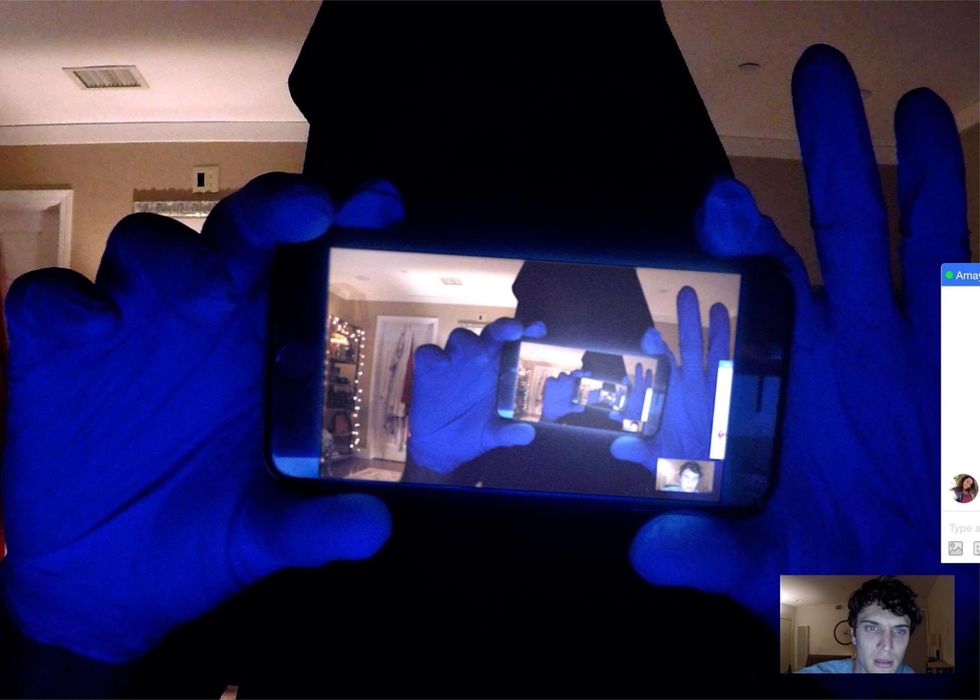What Is The Dark Web? What You Need To Know About This Shady Part Of The Internet
Plus how it affects Canada.

A hacker uses a computer. Right: A person uses a computer for programming.
My fiancé and I recently spent a night in, wanting to watch a creepy movie. We settled on Unfriended: Dark Web, a 2018 horror-thriller directed by Stephen Susco (Red, The Grudge).
The movie, which serves as a stand-alone sequel to the 2015 film Unfriended, follows teen Matias, who comes into the possession of a new laptop that, as the title suggests, is connected to the dark web.
He soon discovers that it contains sinister information and that the previous owner is not only watching him but will also do anything to get it back.
Without spoiling anything, in the film, the dark web is used for criminal activity — including voyeuristic videos and other bad stuff befitting of a horror movie.
Unlike its precursor, which saw teenagers haunted online by the ghost of a former classmate, the events of Unfriended: Dark Web aren't supernatural — they're based in reality and are almost plausible, even.
In fact, the movie took inspiration from real events, according to Susco.
The plot got me wondering about the dark web — what is it exactly? How does it work? And is it really as bad as it's depicted on screen?
If you've seen the movie (it's worth at least one watch if you haven't) and are wondering the same thing, I went on a deep dive to find answers to those questions.

What is the dark web?
To understand the dark web, we first need to talk about the surface web and the deep web. The so-called surface web is what most daily internet users know — it consists of data that search engines, like Google, can find and bring up in response to queries.
But what most users may not know is that the surface web is only the tip of the "internet iceberg."
The rest of it is buried in what's known as the deep web. According to How Stuff Works, the deep web contains data that you wouldn't be able to locate with a simple Google search.
This can be private content or content that is simply not indexed by search engines, like web pages that give you a certain amount of time to access them or some paywalled content.
This type of content is, of course, perfectly legal and is not necessarily hidden intentionally. However, on the dark web, the opposite is true.
The dark web is used to hide or bury data or access sites anonymously. You'd need to have a specific browser and other configurations to be able to access it.
As the Independent reports, the U.S. government developed dark web technology in the 1990s and originally used by intelligence agencies to protect their online communications. A public version was later released in 2002.
One of the most common browsers for accessing the dark web is Tor, aka the Onion Router. The free software helps users browse the internet anonymously by encrypting users' traffic.
This means that when you use Tor to browse online, no one can see what you're doing, link your browsing activities to your identity or track your location, including your internet service provider, hackers, or government agencies.
According to NordVPN, Tor is legal to use in most countries, "except those known for online surveillance and censorship."
What is the dark web used for?
As you can likely guess, given that the dark web allows users to not only hide their identity but their actions from prying eyes, the dark web can be used for some pretty, well, "dark" stuff.
This includes criminal activity, like the selling of drugs, weapons or other illegal goods.
One well-known example of this is the now-defunct Silk Road, a notorious "dark" marketplace offering illegal substances, weapons and even murders for hire. To give you an idea of just how widespread it was, a former FBI special agent called it "the Amazon of drug sites," as CBS reports.
According to the Sun, on Silk Road, you could buy drugs, illegal services (such as hacking into private accounts), pirated content, fake passports and more.
Other examples of what the dark web is used for include promoting terrorism, sharing exploitative content, and arms trafficking.
But it's not all bad — the dark web can have many uses that aren't sinister, like protecting journalists and political dissidents or whistleblowers, and even just those who don't want to be spied on.
The dark web in Canada
The dark web has implications and ties to Canada, for sure.
One particular use of the dark web may be relevant to all Canadians — the execution of cybercrime.
Recently, Canada's biggest bookstore chain, Indigo, said that it expects employee information and personal data that was stolen in a cyberattack last month may soon appear on the dark web, as Global News reports.
In February, Telus said it was dealing with a similar situation and was investigating claims that some employee information, as well as company source code was posted on the dark web as part of a data breach.
It's not just companies affected. According to NordVPN research, 50,000 hacked Canadian credit cards were found to be for sale on the dark web in 2021, as the Toronto Sun reported.
There are even infamous Canadian marketplaces on the dark web.
Last year, one such market called Canadian HeadQuarters, which is said to be one of the largest in the world, was taken off the dark web after the Canadian Radio-television and Telecommunications Commission fined four people linked to the business.
The CRTC says it specialized in "spamming services, phishing kits, stolen credentials and access to compromised computers, which purchasers used for malicious activity," according to CTV.
Is the dark web illegal?
It's said that accessing the dark web itself is not illegal — however, given the amount of illegal activity that takes place on the dark web, poking around on it can get users into trouble.
While digital security companies like Norton and NordVPN offer tips for those wanting to get on the dark web, they also warn that this part of the internet is unregulated, meaning users could fall victim to scams, ransomware, and hackers or be exposed to other illegal activities and inappropriate content.
In other words, it's probably best to stay on top of the iceberg.
This article's cover image was used for illustrative purposes only.
